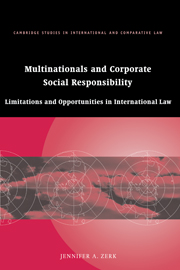 Multinationals and Corporate Social Responsibility
Multinationals and Corporate Social Responsibility Published online by Cambridge University Press: 23 July 2009
Extraterritorial jurisdiction over CSR standards has attracted relatively little academic attention to date. There are two reasons for this. First, overt assertions of extraterritorial jurisdiction by states in relation to social and environmental issues have so far been extremely rare. The social and environmental standards of companies are traditionally regarded as matters for the host state, in which the home state should not, as a general rule, interfere. Second, while attempts by states to influence social and environmental standards beyond their territorial boundaries may sometimes be controversial, they have so far tended not to provoke the same level of political conflict as has been generated by claims of extraterritorial jurisdiction in other regulatory areas, such as competition (or ‘anti-trust’) and economic sanctions.
But the rise of the CSR movement is causing home states to reassess their role in relation to the foreign activities of multinationals based in their respective jurisdictions. There is now a significant degree of public and NGO support for the idea that these states should take much greater interest in the social and environmental performance of multinationals in poorer countries. The previous chapter discusses the jurisdictional principles that limit the powers of home states to regulate the activities of multinationals in other states. However, it is suggested that, while there may be restrictions on ‘foreign-prescriptive’ regulation, there is still scope for other forms of ‘parent-based’ regulation, provided this is done sensitively, and does not infringe the principle of ‘non-intervention’ (i.e. that no state has the right to legislate or enforce its laws in such a way that this interferes in the domestic affairs of another state).
To save this book to your Kindle, first ensure [email protected] is added to your Approved Personal Document E-mail List under your Personal Document Settings on the Manage Your Content and Devices page of your Amazon account. Then enter the ‘name’ part of your Kindle email address below. Find out more about saving to your Kindle.
Note you can select to save to either the @free.kindle.com or @kindle.com variations. ‘@free.kindle.com’ emails are free but can only be saved to your device when it is connected to wi-fi. ‘@kindle.com’ emails can be delivered even when you are not connected to wi-fi, but note that service fees apply.
Find out more about the Kindle Personal Document Service.
To save content items to your account, please confirm that you agree to abide by our usage policies. If this is the first time you use this feature, you will be asked to authorise Cambridge Core to connect with your account. Find out more about saving content to Dropbox.
To save content items to your account, please confirm that you agree to abide by our usage policies. If this is the first time you use this feature, you will be asked to authorise Cambridge Core to connect with your account. Find out more about saving content to Google Drive.